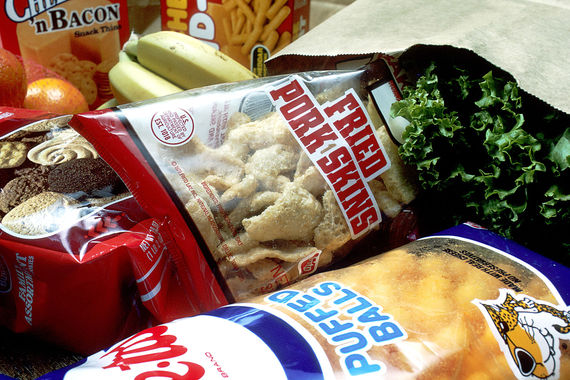Mark Bittman, the food critic for The New York Times wrote recently that food companies are a business in the sense that it's not "How do we produce the best product or healthiest food?" or "How do we steward the land?" but "How do we exploit this position for maximum profit regardless of consequences?"
He suggested reading Salt, Sugar, Fat - How The Food Giants Hooked Us by Michael Moss. It's a great read, but to take a line for the New York Times review:
By concentrating fat, salt and sugar in products formulated for maximum "bliss," Big Food has spent almost a century distorting the American diet in favor of calorie-dense products whose consumption pattern has been mirrored by the calamitous rise in obesity rates.
You get the idea.
The "food" companies have buildings filled with scientists whose only job is to figure our what combination of sweet, salt and fat will get us hooked on things like Doritos. Their concern is not to sell us "food", but rather to sell us stuff to stick in our mouths that we cannot resist. Their goal is not nutrition, but profit.
Reading this, it occurs to me that our media companies are no different -- particularly when it comes to "news and information".
As with the food companies, the "news" companies also spend millions on research to "fine tune" their news broadcasts to maximize the audience, based not on what the audience "needs to know" or "what is important to know" (i.e., the broccoli of world events), but rather on what will satiate the audience's desire to be entertained, and keep them coming back (or at least from switching the channel). It's a diet of news Doritos.
Take a look at the contents of any nightly news show (if you have ever watched one), or even worse a local news show (if you have ever watched that). Fire. Murder. Robbery. Car wreck. None of these has the slightest impact on anyone who is watching, except perhaps for the poor bastard whose house has burned down. In a word -- voyeuristic but empty "calories".
Now, you may say with a touch of arrogance, "I don't watch TV news", and you would not be alone. The VAST majority of people, some 90 percent in this country (and that says a lot right there), no longer watch network news. But, according to the Pew Foundation study, (released just this week) an astonishing 64 percent of Americans get their news from online sources (like Facebook or The Huffington Post).
Fine.
But the things that are discussed on Facebook are a kind of trickle-down from what the network news (and newspapers, another sclerotic media) deem to be important. It still starts there, even if that is not where you catch it.
Which brings us back to the Fast News analogy.
The media companies' only interest is in ratings, or eyeballs when you move online.
And, as such, the "diet" of content is driven not by importance of the story, but rather by what attracts or holds eyeballs? (Kardashians, Johnny Depp, Shot Gorillas and of course, Donald Trump).
Particularly Donald Trump. The former reality TV star is a never-ending train wreck and the "news" organizations cannot get enough of him. He is ratings heroin, and the more they put him on the air, the more credible he becomes. I am sure, deep in their hearts, every TV network and newspaper is praying that he gets into the White House -- a guarantee of ratings nirvana, night after night for four or perhaps (most likely) 8 years.
Donald Trump is the Doritos of Presidential candidates. You know that he is bad for you, but for some reason, you just cannot stop consuming him.
This diet of junk news warps our perception of the world, the things we thing are important, and, as of late, the people we vote for.
So long as media depend upon advertising, this is not going to change. The real question is: is there an alternative besides putting the totality of public discourse in the hands of a very few profit driven corporations?
I think there is.
I think you have a device in your hands (you are probably reading this on it), that allows you to create video coverage of what you think is important.
Now, one person making video content on their iPhone is not going to compete with NBC or CNN, but a few billions people doing it? There are 6 billion smart phones in circulation in the world now -- more smart phones than toothbrushes.
You can't change the media agenda with a toothbrush -- but you can with a phone.
Save the toothbrush to deal with the crap that the food industry is forcing down your throat.
Originally posted in TheVJ.com

